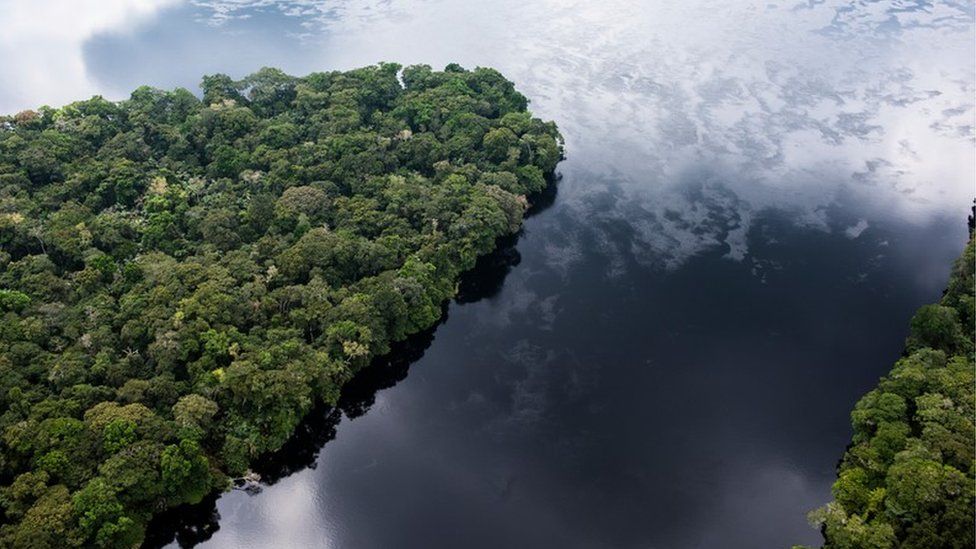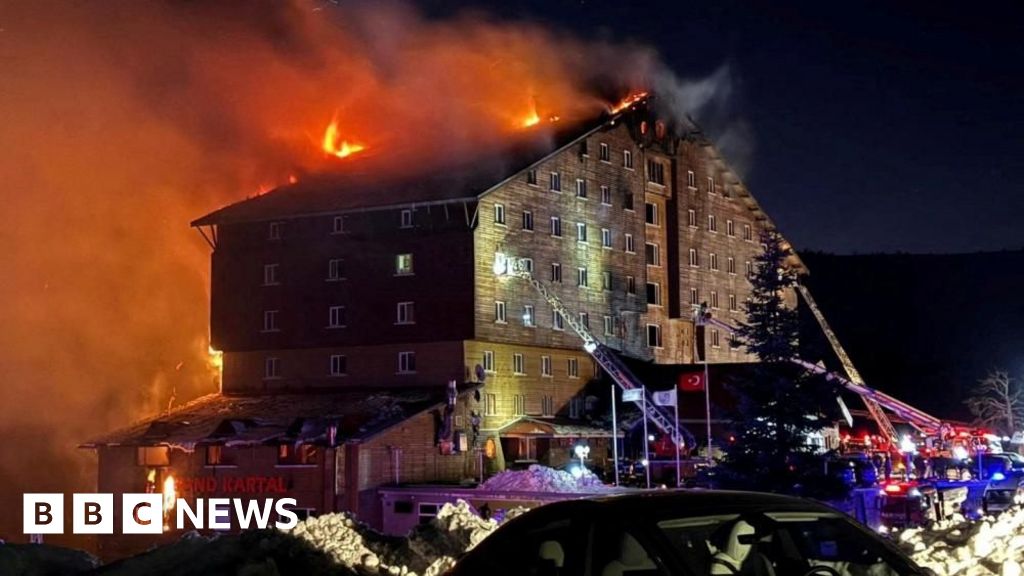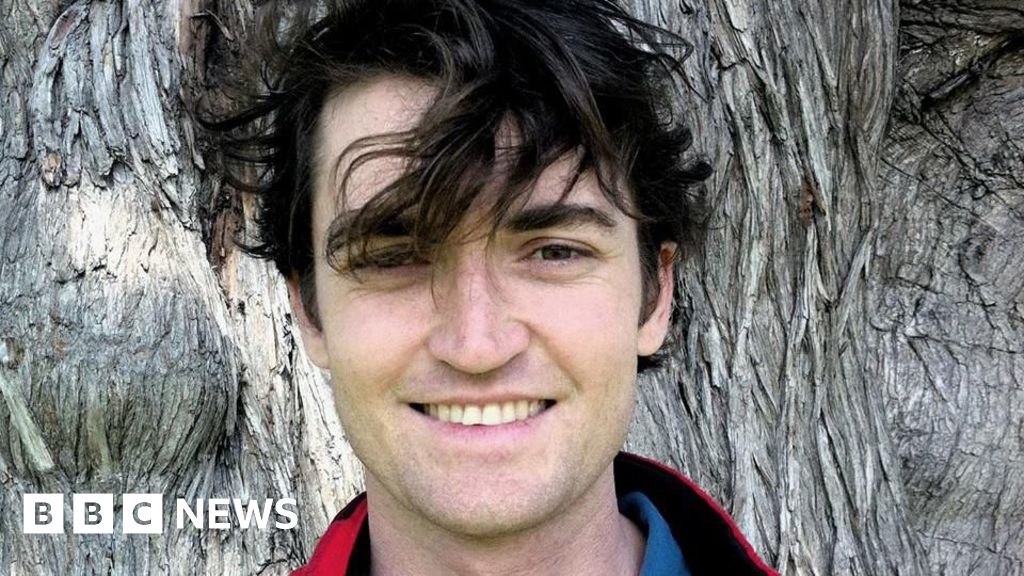ARTICLE AD BOX
 Image source, Daniel Beltrá/Greenpeace Africa
Image source, Daniel Beltrá/Greenpeace Africa
A giant slab of carbon-rich peat, discovered in central Africa, is under threat from uncontrolled development - posing a significant risk for future climate change, writes BBC Africa correspondent Andrew Harding.
After 10 hours by car, another 10 by river in a dugout canoe, three hours hacking a path with machetes through thick tropical undergrowth, then another two wading and clambering through a sweltering forest swamp, the scientists were finally ready to begin work.
Brushing away mud and mosquitos, they assembled a long, metal, corkscrew-like device, and thrust it deep into a patch of dark, water-logged earth.
"Push. Again," said Greta Dargie, the British scientist leading the group, as she and two Congolese colleagues twisted and pushed the rod further into the ground, then pulled out a half-metre cylinder of shiny black peat.
"Not bad at all," said Jodrhy Matoko, a doctoral student from Marien N'Gouabi University in Congo-Brazzaville.
The peat is taken to a university in the UK for analysis
Over the last decade, the close-knit team has spent months at a time camping in the remote swamps that border the giant Congo river, watching out for crocodiles, snakes and lowland gorillas - and mapping the contours of a giant slab of carbon-rich peat, which they now believe could cover an area significantly larger than England.
"We really want to fill in the blanks on the map. It's hard work. But it's always an adventure. I've been doing it for 10 years now, so I must like it," said Dr Dargie, a quietly determined peat expert from the UK's University of Leeds.
Mr Matoko was more effusive: "I'm a forest man. It's a very relaxing place. No stress here."
The scientists - mapping each spot with a GPS monitor - photographed the peat cores, then sealed them in plastic to send off to Leeds University for further analysis.
"This peat is so important in the context of climate change. We have a very large amount - some 30 billion tonnes - of carbon stored here. And if it is released into the atmosphere it is going to accelerate global change," said Suspense Ifo, Congo-Brazzaville's leading expert on the peatlands, who was visiting the team.
"That's about 20 years of US fossil fuel emissions. I think these ecosystems aren't yet valued as they should be at the international level. [The Congo-Brazzaville government] needs the international community to support them financially to ensure these peatlands remain protected," said Dr Dargie.
Image source, Getty Images
Image caption,The Congo rainforests have more than 10,000 animal species and 600 tree species
The peatlands hold far more carbon than the vast forests in which they are found. But the peat, which has taken thousands of years to build up, can be destroyed within a matter of weeks if allowed to dry out.
The main threats come from longer dry seasons, linked to climate change, and from man-made actions like unsustainable farming practices - a serious challenge as Congo-Brazzaville and its neighbours seek to develop their economies and adapt to growing populations.
A more recent concern is the possibility of significant oil deposits being confirmed and exploited, close to the peatlands.
Congo-Brazzaville's government has already begun parcelling out blocks of land and looking for potential investors, although there is some uncertainty about the extent and significance of the oil reserves.
"You can't ask us to keep our natural resources under wraps. If we need to exploit them, we shall exploit them, in a sustainable way and in accordance with environmental rules," said Congo-Brazzaville's Environment Minister Arlette Soudan-Nonault, dismissing concerns about corruption and mismanagement.
"You can't keep saying: 'These Africans - they misuse funds.' It's time we understood that it is in our common interest to conserve [the peatlands]. Because if [the West] doesn't help support our conservation work, we shall be obliged to use our own natural resources, because we need money simply to live," she added.
The Congo river is the second longest in Africa, after the Nile
Moves to exploit the resources buried beneath the peatlands are already under way across the river in the Democratic Republic of the Congo.
Its Hydrocarbons Minister, Didier Budimbu, recently announced an auction of land that is to be developed for oil production. Scientists say some of the earmarked sites overlap the peatlands.
In a recent cabinet meeting, Mr Budimbu told colleagues that "national oil production must leave the modest zone of 25,000 barrels a day".
The hydrocarbons ministry has been tagging the French oil firm Total in its tweets about the auction set for 28 and 29 July in DR Congo's capital, Kinshasa, but neither the firm nor the minister responded to the BBC's requests for comment.
"If this plan is not stopped it will have disastrous consequences," said Irene Wabiwa Betoko from Greenpeace Africa.
"So it's very imperative that the DR Congo government and donors put their effort to stop the oil blocks and start talking renewable energy."
Back across the Congo river, Jordan Elenga steers his tiny, wobbling dugout through a swamp clogged with palm trees.
"Gently, gently," he says.
He clambered on to the roots of one tree, hacked a deep hole in the side with a machete, then used strands of bark to attach a plastic container to catch the palm wine, before moving on to the next tree.
Jordan Elenga makes his living collecting palm wine
"Collecting wine is my main source of income. It's how I feed my wife and children," Mr Elenga says.
Watching him, Professor Suspense Ifo let out a long sigh of frustration.
"This kills the trees. It's a real threat to the peatland ecosystem. In the long term it could destroy it.
"The problems here are linked to population growth, and if poverty is not addressed then everyone will come to this ecosystem to make money," the professor said, explaining that when the trees die, they expose the delicate peat to harmful sunlight.
BBC
Without the Congo Basin, the rest of the world couldn't breathe. We Africans provide an eco-systemic service for the whole planet"
On a wide tributary of the Congo river, in the tiny, run-down town of Ntokou, the local administrator, Alphonse Essabe, sat in a half-built government mansion and acknowledged a "public information vacuum" regarding the peatlands.
"We live from fishing and hunting here. But if we are to live in harmony with our peatlands, then the big powers, the world's big polluters, need to provide funding to help us," he said.
But despite a series of international agreements about the need to protect the peatlands of the Congo Basin, there is growing frustration in the region, with ministers like Ms Soudan-Nonault accusing the West of hypocrisy.
"Without the Congo Basin, the rest of the world couldn't breathe. We Africans provide an eco-systemic service for the whole planet. It makes sense that such a service has a price.
The Congo river has Africa's largest network of navigable waterways
"Now that the Amazon has lost its role as the regulator of the world climate due to deforestation… the Congo Basin acts as the lungs of humanity. And the kidneys too," she said, of the peatlands' ongoing role in capturing CO2 from the atmosphere.
"What has happened to all the promises made by the international community? You can't tell us: 'Tighten your belt so the rich world can breathe.' In the meantime, you get richer, and we are starving.
"We won't be able to restrain ourselves indefinitely," said Ms Soudan-Nonault, hinting that Congo-Brazzaville would turn to China for assistance and that "we will accept the best offers" of support.
Congo-Brazzaville's authoritarian government, buoyed by revenues from its offshore oil fields, and listed as one of the world's most corrupt countries, has brushed aside complaints that it is attempting to blackmail the West into funding projects to support the peatlands.
"Let's not talk like that. We are ready. We have an investment plan. There's no reason why we cannot receive this funding," said Ms Soudan-Nonault.
All photos subject to copyright

 2 years ago
25
2 years ago
25








 English (US) ·
English (US) ·